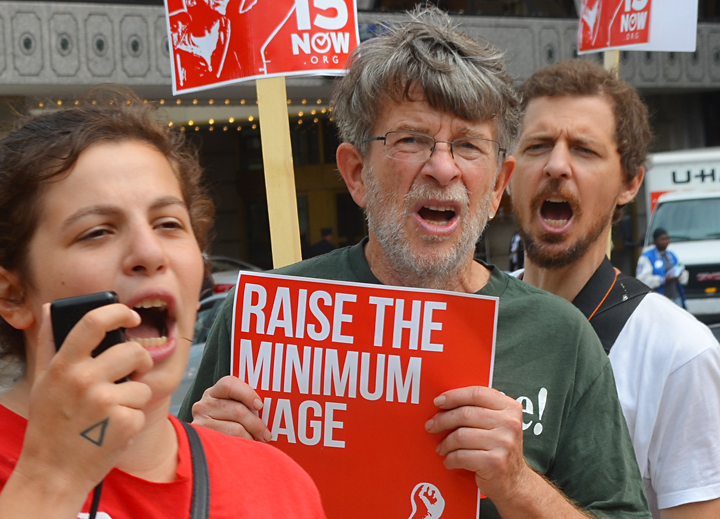

Share
Activists will deliver a petition to Minneapolis City Hall Wednesday with signatures from about 20,000 registered voters who support amending the city’s charter to guarantee workers a $15 minimum wage.
The move, organizers with 15 Now Minnesota said, puts the amendment on track to appear on the Nov. 8 ballot. If approved, Minneapolis would join more than 30 cities nationwide with strong minimum-wage ordinances, including Seattle, San Francisco, Los Angeles and Washington D.C.
“If they get it, why can’t we get it?” McDonald’s worker Steven Suffridge, a member of the low-wage worker center CTUL, said during a conference call with reporters Monday. The outpouring of support for the petition drive, he added, shows “people are coming to the realization that yes, we are worth $15 an hour.”
Indeed, 15 Now volunteers collected nearly three times the number of signatures required to compel a vote. Several unions supported the petition drive, including the Communications Workers, the Machinists, Minneapolis Federation of Teachers Local 59, the Minnesota Nurses Association, the Letter Carriers and Teamsters Local 320.
Anticipating pushback from corporations and other special interests, 15 Now Minnesota released a legal memo detailing the legal basis for their ballot initiative.
Laura Huizar, an attorney with the National Employment Law Project who analyzed the legal landscape in Minneapolis, said a minimum-wage ordinance would fall under the city’s “broad powers to address the health, safety and well being of its citizens,” similar to ordinances regulating liquor sales or the number of hours workers can log at a job in one day.
Karen Marty, a former city attorney in Minneapolis, said the city is required to put a proposed charter amendment on the ballot as long as it meets the signature threshold and does not include language in conflict with state or local law.
“The charter doesn’t limit what citizens can offer as amendments,” Marty said. “Minneapolis can adopt a law or a charter provision on any topic that’s not prohibited, which would include a $15 minimum wage.”
When courts around the country have considered whether a city can enact a local minimum wage, the attorneys added, most have upheld those local laws – as long as they don’t conflict with state law. Minnesota law does not currently preclude a local minimum wage, although Republican lawmakers are plotting ways to roll back local control over employment standards.
“We determined that the city has the power to enact a local wage, and we also concluded that this can, in fact, be done by a charter amendment proposed by voters on the November ballot,” Huizar said.
For the city’s low-wage workers, who include a disproportionate number of women and people of color, the pay raise can’t come too soon. It’s estimated 38 percent of people who work in Minneapolis would see their wages increase with a $15 minimum wage, and supporters say it would mark a big step forward in efforts to address racial inequities in the Twin Cities that are among the worst in the U.S.
“Currently, more and more people have to work ridiculous hours at multiple jobs which in many cases leaves no guarantee they will even have enough to get by,” said Marcellina Reis, a restaurant server and member of the community group Neighborhoods Organizing for Change. “It also doesn’t allow them time to function like human beings. Having little to no time to build family, community and find happiness creates physical and mental health damage and brings our society down, not only affecting those struggling to live but everyone in Minneapolis.”

